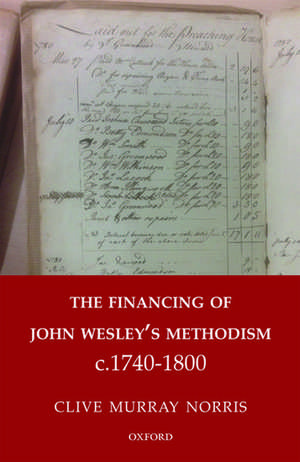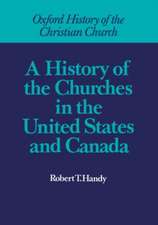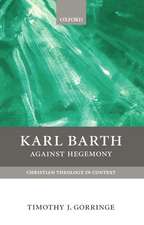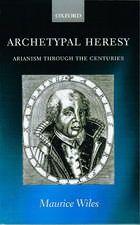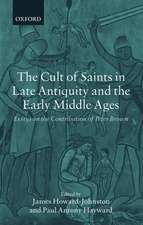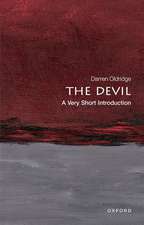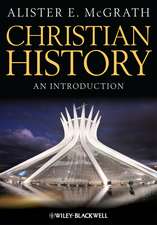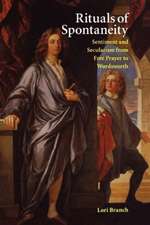The Financing of John Wesley's Methodism c.1740-1800
Autor Clive Murray Norrisen Limba Engleză Hardback – 9 feb 2017
Preț: 614.67 lei
Preț vechi: 880.74 lei
-30% Nou
Puncte Express: 922
Preț estimativ în valută:
117.61€ • 122.80$ • 97.34£
117.61€ • 122.80$ • 97.34£
Carte tipărită la comandă
Livrare economică 25-31 martie
Preluare comenzi: 021 569.72.76
Specificații
ISBN-13: 9780198796411
ISBN-10: 0198796412
Pagini: 334
Dimensiuni: 161 x 241 x 25 mm
Greutate: 0.61 kg
Editura: OUP OXFORD
Colecția OUP Oxford
Locul publicării:Oxford, United Kingdom
ISBN-10: 0198796412
Pagini: 334
Dimensiuni: 161 x 241 x 25 mm
Greutate: 0.61 kg
Editura: OUP OXFORD
Colecția OUP Oxford
Locul publicării:Oxford, United Kingdom
Recenzii
Researchers will revel in Norris's book though casual readers could find the copious detail intrusive to the flow of the text. Those interested in the early history of Methodism and have a head for figures or finance will gain the most from this book.
As a book examining the financial aspects of Wesleyan Methodism, this book is excellent, making extensive use of primary sources, and constructing a well-researched and compelling argument.
The financing of John Wesleys Methodism is clearly presented, painstakingly researched, and deserves to become a standard work of reference that will illuminate a previously rather 'dark' area in the history of eighteenth-century Methodism. It begs for a similar treatment of Methodism in the nineteenth and twentieth centuries, and I cannot commend it too highly.
Norris forces us to look at religious enterprises differently. He reminds us that spreading the gospel came at a cost, both a personal and a financial one. The Financing of John Wesleys Methodism is therefore an indispensable read bringing a persisting gap between religions and economic history. More importantly, this enlightening work offers new answers to why some religious movements like the Methodists successfully institutionalized themselves when others failed.
Clive Murray Norris's exploration of the financial management and organization of 18th-century Methodism not only sheds new light on the complexities of the denomination's origins and early growth, but addresses themes that resonate with more recent Methodist history and current practice. Based on the author's PhD thesis, The Financing of John Wesley's Methodism c. 1740-1800 is a richly detailed study of a wide range of primary sources set in the broader contexts of Methodist history and British economic history... This book therefore makes a valuable contribution to our understanding of the day-to-day functioning of early Methodism.
As a book examining the financial aspects of Wesleyan Methodism, this book is excellent, making extensive use of primary sources, and constructing a well-researched and compelling argument.
The financing of John Wesleys Methodism is clearly presented, painstakingly researched, and deserves to become a standard work of reference that will illuminate a previously rather 'dark' area in the history of eighteenth-century Methodism. It begs for a similar treatment of Methodism in the nineteenth and twentieth centuries, and I cannot commend it too highly.
Norris forces us to look at religious enterprises differently. He reminds us that spreading the gospel came at a cost, both a personal and a financial one. The Financing of John Wesleys Methodism is therefore an indispensable read bringing a persisting gap between religions and economic history. More importantly, this enlightening work offers new answers to why some religious movements like the Methodists successfully institutionalized themselves when others failed.
Clive Murray Norris's exploration of the financial management and organization of 18th-century Methodism not only sheds new light on the complexities of the denomination's origins and early growth, but addresses themes that resonate with more recent Methodist history and current practice. Based on the author's PhD thesis, The Financing of John Wesley's Methodism c. 1740-1800 is a richly detailed study of a wide range of primary sources set in the broader contexts of Methodist history and British economic history... This book therefore makes a valuable contribution to our understanding of the day-to-day functioning of early Methodism.
Notă biografică
Clive Norris is an Independent Scholar.
